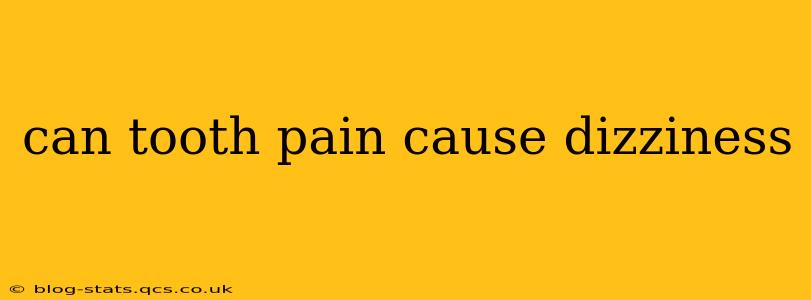Can Tooth Pain Cause Dizziness? Understanding the Connection
Tooth pain is rarely the direct cause of dizziness, but the two can be linked through several indirect pathways. While a throbbing molar isn't likely to spin your world, the associated stress, infection, or underlying health issues can contribute to feelings of lightheadedness or vertigo. Let's explore the potential connections.
Can a severe toothache cause dizziness?
While not a typical symptom, severe tooth pain can indirectly cause dizziness, particularly if the pain is intense and prolonged. The overwhelming discomfort can lead to:
-
Stress and anxiety: Intense pain triggers the body's stress response, releasing adrenaline. This can increase heart rate and blood pressure, potentially causing feelings of dizziness or lightheadedness. The anxiety associated with severe pain can further exacerbate these symptoms.
-
Dehydration: Severe tooth pain can disrupt sleep and appetite, leading to dehydration. Dehydration is a common cause of dizziness. The body needs adequate fluid intake to maintain proper blood pressure and circulation.
-
Medication side effects: Some pain relievers, especially stronger prescription medications, can list dizziness as a potential side effect. This is more likely with prolonged or high-dose usage.
What other symptoms might accompany tooth pain and dizziness?
The presence of other symptoms can offer clues to the underlying cause. If you experience dizziness along with tooth pain, you might also notice:
- Fever: Suggests infection, potentially an abscess requiring immediate dental attention.
- Swelling: Inflammation around the affected tooth is common, especially with infections.
- Headache: Pain can radiate from the jaw and teeth into the head.
- Earache: Proximity of teeth and ears means that dental problems can sometimes manifest as earaches.
- Nausea: Intense pain can trigger nausea and vomiting.
- Fatigue: Prolonged pain and sleep disruption can cause significant fatigue.
Does a tooth infection cause dizziness?
A severe tooth infection (abscess) can indirectly lead to dizziness through several mechanisms. The infection itself can cause a systemic inflammatory response, which can impact blood pressure and circulation. Furthermore, the infection might spread to other areas, causing more serious complications that directly or indirectly affect balance and equilibrium. Always seek professional medical advice for a suspected tooth infection.
Should I see a doctor or dentist if I have tooth pain and dizziness?
Yes, it's crucial to seek medical attention if you experience tooth pain accompanied by dizziness. While the dizziness might be unrelated, it's important to rule out any serious underlying health conditions. Your dentist can assess the dental problem, and your doctor can determine if the dizziness has other causes. Ignoring severe pain and dizziness can be risky.
Can wisdom tooth pain cause dizziness?
Wisdom teeth, due to their location and potential for impaction, are prone to causing significant pain and inflammation. This pain can, through the mechanisms discussed above (stress, dehydration, infection), potentially trigger dizziness. Impacted wisdom teeth often require extraction, which itself can also lead to temporary dizziness due to the procedure or post-operative medication.
In conclusion, while tooth pain itself doesn't directly cause dizziness, the associated pain, infection, stress, medication, or dehydration certainly can. If you experience both, prompt consultation with a dentist and possibly a physician is advisable to identify and address the root cause(s). Don't delay seeking professional help, especially if the pain or dizziness is severe.
